Addison’s recommendations to the IMF at IMF-African Caucus Meeting in Morocco
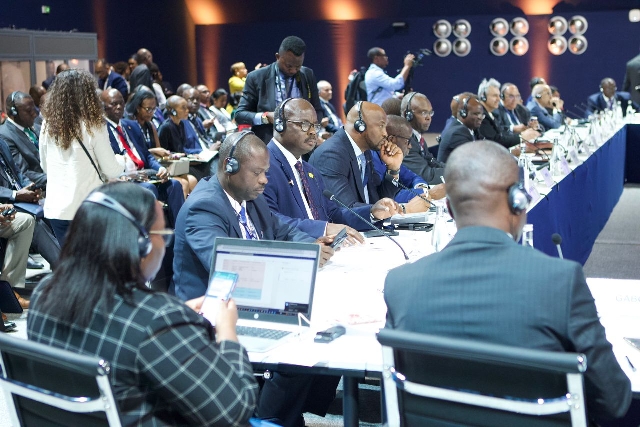 At the IMF-Africa caucus meeting in Morocco
At the IMF-Africa caucus meeting in Morocco
Governor of the Bank of Ghana, Dr. Ernest Addison, has highlighted the challenges posed by prolonged high inflation, limiting policy flexibility and presenting difficult trade-offs for numerous African nations. He emphasized that this challenging economic scenario has led to a slowdown in Sub-Saharan Africa's growth trajectory, projecting a further deceleration in 2023.
Despite these obstacles, Dr. Addison reiterated the commitment of member countries to implementing appropriate policies and reforms aimed at enhancing fiscal discipline, restoring debt sustainability, and promoting inclusive and sustainable growth across the continent. He stressed the importance of robust support from the International Monetary Fund (IMF) within the current global challenges.
During the IMF-African Caucus Meeting themed 'Making Public Debt Useful for Sustainable Growth in Africa', Dr. Addison made several recommendations:
1.Urging the IMF to adapt lending toolkits to changing global conditions to better support vulnerable members.
2.Advocating increased concessional financing by aligning access thresholds to ensure uniform treatment.
3.Calling for relaxation of PRGT eligibility criteria to enhance access to adequate Fund support for vulnerable PRGT-eligible members facing acute debt challenges.
4.Encouraging additional pledges from donors to bridge gaps in PRGT resources and reinforcing IMF finances to protect the quota share of vulnerable members.
5.Proposing the establishment of a Global Sovereign Debt Roundtable (GSDR) to strengthen multilateral coordination and regulatory efficiency for debt resolution in LICs.
6.Emphasizing the need to revamp the G20 Common Framework (CF) for timely, equitable, and transparent debt restructuring for distressed members in the region.
7.Suggesting a carefully designed debt resolution mechanism, especially for vulnerable members with large domestic creditors, to prevent domestic financial market instability.
8.Reiterating the request for debt standstill during negotiations and multilateral debt cancellation for the most vulnerable members facing acute debt challenges.
9.Advocating for enhanced IMF cooperation with MDBs/RDBs to facilitate timely provision of financial assistance for members facing significant debt and growth challenges.
10.Requesting new Special Drawing Rights (SDR) allocation through MDBs/RDBs to achieve climate and development goals, and advocating for better lending terms from the ongoing design and implementation of the G20 Capital Adequacy Framework.
In conclusion, Governor Addison stressed the importance of deepening tailored capacity development and surveillance support from the IMF to address member-specific challenges and promote economic growth and development in the region, in collaboration with other international partners.
Read Dr Ernest Addison's full speech below:
World Bank/IMF Meetings - Marrakech, Morocco
IMF-African Caucus Meeting
Topic: Making Public Debt Useful for Sustainable Growth in Africa
Speaker: Dr. Ernest Addison, Governor, Bank of Ghana
Venue: Marrakech, Morocco
Date: 10th October 202
I appreciate the opportunity today to speak on behalf of my fellow Governors about making public debt useful for sustainable growth in Africa. But let me first express my deepest commiserations to the authorities and the peoples of Morocco and Libya for the recent devastating tragedies that have claimed many lives, displaced many people, and destroyed properties, while appealing for urgent support from the international community.
Madam Managing Director, African economies are faced with acute debt challenges underscored by rising social and infrastructural needs, amid spillovers from the Covid-19 pandemic, the war in Ukraine, tightening of global financing conditions, and climate-related disasters.
Public debt in sub-Saharan Africa (SSA) has now reached levels last seen in the early 2000s.
The resultant increased debt service burden, together with complex creditor composition, has heightened risks to debt sustainability, to the extent that more than half of the SSA members are now in or at high risk of debt distress.
Simultaneously, protracted high inflation has constricted the policy space, posing difficult policy trade-offs for many members in the region.
This challenging environment has led to another year of moderated pace of economic recovery, as SSA growth is projected to further decelerate in 2023.
While members remain committed to implementing relevant policies and reforms towards enhancing fiscal discipline with the aim of restoring debt sustainability and fostering inclusive and sustainable growth in the continent, a much stronger IMF support would be crucial, amid the current challenging global environment.
Against this backdrop, I would suggest the following for consideration, Madam Managing Director:
▪ Given the fragmented global financial architecture, we urge the IMF to remain steadfast and adapt its lending toolkits to changing global conditions to serve its vulnerable membership better.
In this context, we restate our earlier request for increased concessional financing by aligning PRGT access thresholds with those of the GRA to ensure uniformity of treatment.
In addition, we call on the Fund to relax the PRGT eligibility criteria to foster access to adequate Fund support while reducing, suspending, or eliminating entirely surcharges for most vulnerable PRGT-eligible members facing acute debt challenges.
We also reiterate our call for additional pledges from willing donors to
close the gaps in PRGT resources.
We further stress the criticality of a successful completion of the ongoing 16th GRQ to reinforce IMF finances while protecting the quota share of the vulnerable members.
▪ Strengthening multilateral coordination and efficiency of regulatory framework for debt resolution in LICs, through a formidable Global Sovereign Debt Roundtable (GSDR), is paramount.
While welcoming the latest developments on Zambia and Chad, we underscore the need to revamp the G20 Common Framework (CF) to ensure timely, orderly, equitable, inclusive, and transparent debt restructuring for distressed members in the region (including, Ghana, Ethiopia, and Malawi).
In this regard, we call for a carefully designed debt resolution mechanism, especially, for vulnerable members with large-domestic creditors (as in the case of Ghana) to help avert domestic financial market instability.
In addition, improving debtor-creditor engagements through an enhanced
GSDR while strengthening technical support to foster common understanding of all debt issues is macro-critical to bolster a swifter, proactive and systematic restructuring.
We also reaffirm the request for debt standstill during times of negotiations to offer immediate relief to debtors and restate our request for multilateral debt cancellation for the most vulnerable members facing acute debt challenges.
• Furthermore, an enhanced IMF’s cooperation with MDBs/RDBs is necessary to facilitate timely provision of MDBs/RDBs’ financial assistance for members facing significant debt and growth challenges.
In this context, we restate the call for new SDR allocation through the MDBs/RDBs’ (including AfDB), given their multiplier effects in achieving climate and development goals.
We also request that the Fund leverages its close engagements with G20 members to advocate for better lending terms from the ongoing design and implementation of the G20 Capital Adequacy Framework (for MDBs) to avert inadvertent financing ramifications on vulnerable members in Africa.
▪ Finally, deepening the Fund’s tailored capacity development and surveillance support, in collaboration with other international partners, is crucial to addressing member-specific bottlenecks for restoring public debt sustainability, and bolstering inclusive and sustainable economic growth and development in the region.
Thank you, Chair and Madam Managing Director.
Trending Business

Calls mount for completion of Saglemi Housing Project under new minister’s leadership
14:00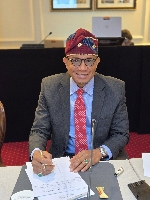
ARDA to showcase achievements in petroleum downstream sector in April
13:36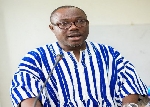
Prof. Ransford Gyampo appointed as Acting CEO of Ghana Shippers Authority
12:02
Angela List reaffirms shareholder and director position at BCM International
06:50
Gov't gets MoU with official creditor committee to formalize debt relief
13:49
New NPA boss pledges to take the Authority to the next level
10:31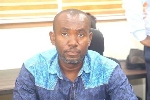
Shafic Suleman appointed Acting Executive Secretary of PURC
11:48
Tripartite Committee begin negotiations on 2025 minimum wage
11:13
Maame Efua Houadjeto engages GTA staff, sets vision for tourism growth
10:18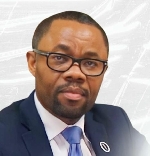
Moses Klu Mensah appointed Deputy CEO of Ghana Export-Import Bank
18:33




